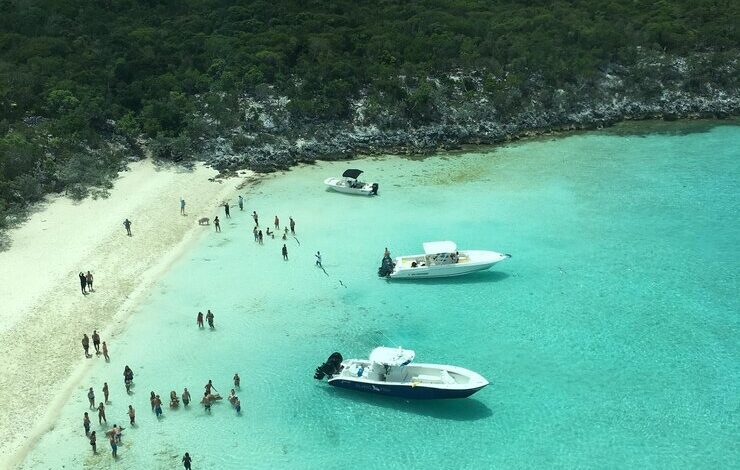Ship Interception at Isla Mujeres: A Comprehensive Overview

Isla Mujeres, a picturesque island located just off the coast of Cancun, Mexico, is known for its stunning beaches, vibrant culture, and rich marine life. However, in recent years, it has also gained attention for a different reason: ship interceptions. This article delves into the phenomenon of ship interception at Isla Mujeres, exploring its causes, implications, and the broader context of maritime security in the region.
Understanding Ship Interception
Ship interception refers to the act of stopping and boarding a vessel at sea, typically conducted by naval or coast guard forces. This action is often taken to enforce laws, prevent illegal activities, or ensure maritime security. Interceptions can involve various types of vessels, including cargo ships, fishing boats, and recreational crafts.
Reasons for Ship Interception
There are several reasons why authorities may choose to intercept a ship. Some of the most common include:
-
Illegal Fishing: Overfishing and illegal fishing practices have become significant concerns in many regions, including the waters surrounding Isla Mujeres. Authorities may intercept vessels suspected of fishing without proper licenses or in protected areas.
-
Drug Trafficking: The Caribbean region has long been a hotspot for drug trafficking. Ships suspected of transporting illegal substances may be intercepted to prevent the flow of drugs into the United States and other countries.
-
Human Trafficking: The interception of vessels can also be a measure to combat human trafficking. Authorities may stop ships suspected of carrying individuals who are being smuggled or trafficked.
-
Environmental Violations: Ships that violate environmental regulations, such as dumping waste or harming marine ecosystems, may be intercepted to protect the delicate balance of marine life in the area.
-
Security Threats: In some cases, ships may be intercepted due to concerns about national security. This could involve vessels that are suspected of carrying weapons or engaging in other illicit activities.
The Context of Isla Mujeres
Isla Mujeres is strategically located near major shipping routes, making it a focal point for maritime activities. The island’s proximity to Cancun, a popular tourist destination, adds to its significance. However, this also means that the waters surrounding Isla Mujeres are often busy with various types of vessels, increasing the likelihood of illegal activities.
The Role of the Mexican Navy
The Mexican Navy plays a crucial role in maintaining maritime security in the waters around Isla Mujeres. With a mandate to protect the country’s territorial waters, the Navy conducts regular patrols and surveillance to monitor ship activities. Their efforts are aimed at preventing illegal fishing, drug trafficking, and other unlawful activities.

Operations and Tactics
The Mexican Navy employs various tactics to intercept ships effectively. These may include:
- Surveillance: Utilizing radar and satellite technology to monitor vessel movements in real-time.
- Patrols: Conducting regular patrols in high-traffic areas to deter illegal activities.
- Boarding Operations: When a suspicious vessel is identified, naval forces may approach and board the ship to conduct inspections.
Collaboration with Other Agencies
The Mexican Navy often collaborates with other agencies, both domestically and internationally, to enhance maritime security. This includes working with the Coast Guard, customs officials, and international law enforcement agencies to share intelligence and coordinate operations.
Recent Incidents of Ship Interception
In recent years, there have been several notable incidents of ship interception near Isla Mujeres. These events highlight the ongoing challenges faced by authorities in maintaining maritime security.
Case Study 1: Illegal Fishing Operations
One of the most common reasons for ship interception in the area is illegal fishing. In a recent operation, the Mexican Navy intercepted a vessel suspected of fishing in a protected marine reserve near Isla Mujeres. Upon boarding the ship, authorities discovered a large catch of endangered species, leading to the arrest of the crew and the confiscation of the vessel.
This incident underscores the importance of protecting marine ecosystems and enforcing fishing regulations. The interception not only prevented further illegal fishing but also sent a strong message to other potential violators.
Case Study 2: Drug Trafficking Interception
Another significant incident involved the interception of a cargo ship suspected of transporting illegal drugs. The Mexican Navy, acting on intelligence from international partners, tracked the vessel as it approached Isla Mujeres. After confirming its suspicious activities, naval forces intercepted the ship and conducted a thorough search.
During the operation, authorities discovered a substantial quantity of narcotics hidden within the cargo. The successful interception not only disrupted a major drug trafficking operation but also demonstrated the effectiveness of international cooperation in combating drug-related crime.
Case Study 3: Human Trafficking Prevention
In a more recent operation, the Mexican Navy intercepted a small boat near Isla Mujeres that was suspected of carrying individuals being trafficked. Upon boarding the vessel, authorities found several individuals who were in distress and needed assistance. The Navy promptly rescued the individuals and apprehended the crew members involved in the trafficking operation.
This incident highlights the critical role of ship interception in addressing human trafficking and protecting vulnerable populations. It also demonstrates the importance of vigilance and proactive measures in maritime security.
The Implications of Ship Interception
The practice of ship interception at Isla Mujeres has far-reaching implications for various stakeholders, including local communities, the environment, and international relations.
Impact on Local Communities
For the residents of Isla Mujeres, ship interceptions can have both positive and negative effects. On one hand, successful interceptions help protect local fisheries and marine resources, ensuring that the livelihoods of local fishermen are not compromised by illegal activities. On the other hand, increased naval presence and operations may lead to concerns about tourism and the perception of safety in the area.
Environmental Protection
The interception of vessels engaged in illegal fishing and environmental violations plays a crucial role in safeguarding marine ecosystems. By enforcing regulations and preventing harmful practices, authorities contribute to the preservation of biodiversity and the health of the ocean. This is particularly important for Isla Mujeres, which is known for its coral reefs and rich marine life.
International Relations and Cooperation
Ship interception operations often involve collaboration between countries, particularly in the fight against drug trafficking and human smuggling. The success of these operations can strengthen diplomatic ties and foster cooperation in addressing shared challenges. However, they can also lead to tensions if there are disagreements over jurisdiction or enforcement practices.
Challenges in Ship Interception
Despite the efforts of the Mexican Navy and other authorities, ship interception remains a complex and challenging task. Several factors contribute to these challenges:
Evasion Tactics
Criminal organizations involved in illegal fishing, drug trafficking, and human smuggling often employ sophisticated tactics to evade detection. This includes using smaller, faster vessels that can navigate through shallow waters or altering their routes to avoid patrols. As a result, authorities must continuously adapt their strategies to stay one step ahead.
Resource Limitations
The Mexican Navy, like many maritime enforcement agencies, faces resource constraints. Limited personnel, funding, and equipment can hinder the effectiveness of interception operations. Ensuring adequate training and resources is essential for maintaining a robust maritime security presence.
Legal and Jurisdictional Issues
Interception operations can also be complicated by legal and jurisdictional issues. Determining the appropriate legal framework for boarding and inspecting vessels can be challenging, particularly in international waters. Authorities must navigate complex legal landscapes to ensure that their actions are justified and compliant with international law.
The Future of Ship Interception at Isla Mujeres
As maritime security challenges continue to evolve, the future of ship interception at Isla Mujeres will likely involve several key developments:
Enhanced Technology
Advancements in technology will play a crucial role in improving interception capabilities. The use of drones, advanced surveillance systems, and artificial intelligence can enhance monitoring and detection efforts, allowing authorities to respond more effectively to suspicious activities.
Increased Collaboration
The need for international cooperation will become even more critical as maritime threats grow. Strengthening partnerships between countries and agencies will facilitate information sharing and coordinated operations, leading to more successful interceptions.
Community Engagement
Engaging local communities in maritime security efforts can enhance the effectiveness of interception operations. By fostering awareness and collaboration, authorities can empower residents to report suspicious activities and contribute to the protection of their marine resources.
Focus on Sustainability
As the importance of environmental protection continues to rise, future interception efforts may place greater emphasis on sustainability. Authorities may implement more comprehensive strategies to address illegal fishing and environmental violations, ensuring that marine ecosystems are preserved for future generations.
Conclusion
Ship interception at Isla Mujeres is a multifaceted issue that encompasses various challenges and implications. While the interception of vessels plays a vital role in maintaining maritime security and protecting local resources, it also requires ongoing adaptation and collaboration among authorities. As technology advances and international cooperation strengthens, the future of ship interception in the region holds promise for enhancing maritime safety and security. By addressing the challenges and fostering community engagement, Isla Mujeres can continue to thrive as a beautiful destination while ensuring the protection of its marine environment and the well-being of its residents.



